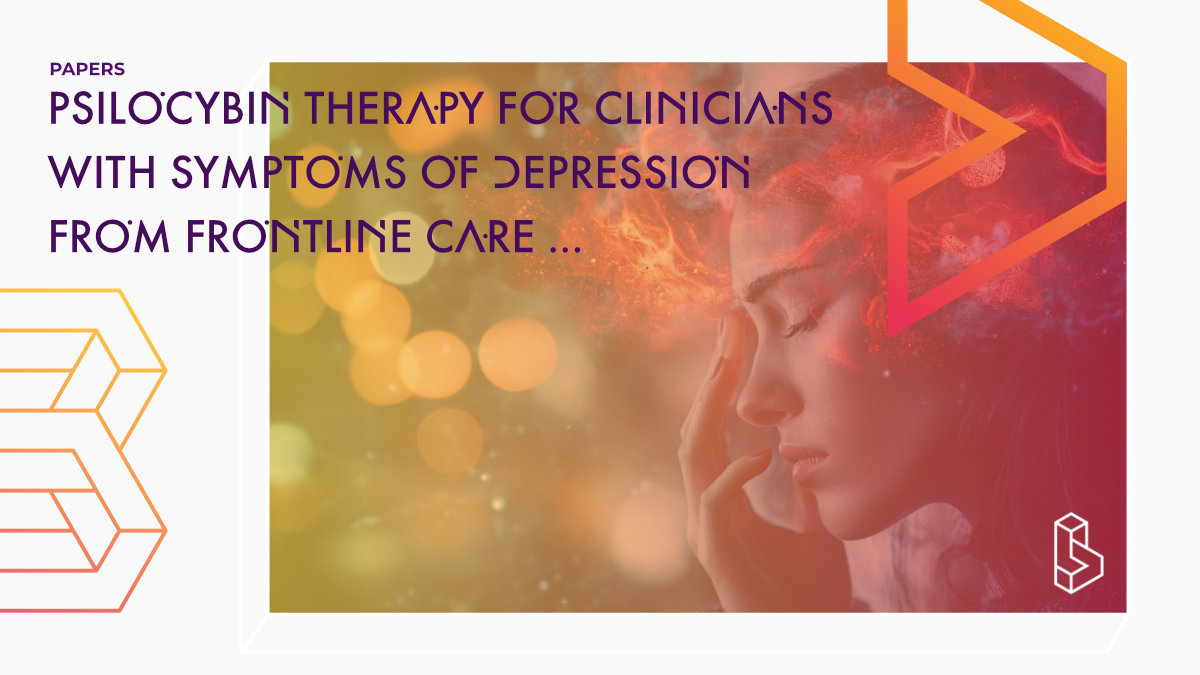This double-blind randomized trial (n=30) finds that psilocybin therapy significantly reduces symptoms of depression in clinicians after frontline work during the COVID-19 pandemic. Psilocybin (25mg) showed greater reductions in depression (MADRS scores) and PTSD symptoms compared to the niacin control, though PTSD findings were not statistically significant.
Abstract of Psilocybin Therapy for Clinicians With Symptoms of Depression From Frontline Care During the COVID-19 Pandemic
“Objective To investigate whether psilocybin therapy could improve symptoms of depression, burnout, and PTSD in US clinicians who developed these symptoms from frontline clinical work during the pandemic.
Design, Setting, and Participants This double-blind randomized clinical trial enrolled participants from February to December 2022. Participants included physicians, APPs, and nurses who provided frontline care for more than 1 month during the pandemic and had no pre-pandemic mental health diagnoses but had moderate to severe symptoms of depression at enrollment. Participants were randomly assigned to either the psilocybin or niacin arm. Data analysis was conducted between December 2023 and May 2024 and was based on the intention-to-treat principle.
Intervention One intervention episode consisted of 2 preparation visits, 1 medication session, and 2 integration visits. At the medication session, participants received psilocybin, 25 mg, or niacin, 100 mg, orally.
Main Outcome and Measures The primary outcome was a change from baseline (preparation session 1) to day 28 (after medication administration) in symptoms of depression as measured by the clinician-administered Montgomery-Asberg Depression Rating Scale (MADRS) used by blinded raters. Secondary outcomes were changes in symptoms of burnout (measured with the Stanford Professional Fulfillment Index [SPFI]) and symptoms of PTSD (measured with the Posttraumatic Checklist for Diagnostic and Statistical Manual of Mental Disorders, Fifth Edition [PCL-5]).
Results A total of 30 clinicians (15 females [50%]; mean [range] age, 38 [29-60] years) were randomly assigned to receive psilocybin and 15 to receive niacin. The mean decrease in depression (MADRS scores) from preparation 1 session to day 28 was −9.33 (7.32) in the niacin arm, with a mean difference of −12.00 (95% CI, −17.67 to −6.33; P < .001), a decrease in MADRS scores significantly favoring psilocybin. The mean change in SPFI scores from preparation 1 session to day 28 was 1.00 (2.18) in the psilocybin arm vs −0.18 (1.98) in the niacin arm (mean difference, 1.18; P = .05) but was not statistically significant. While SPFI score change did not reach statistical significance, the PCL-5 score change was evaluated descriptively. The mean change in PCL-5 scores showed a numerically larger decrease in symptoms of PTSD from preparation 1 session to day 28 in the psilocybin vs the niacin arm (−16.67 [15.04] vs −6.73 [10.69]), but this difference was not statistically tested.”
Authors: Anthony L. Back, Timara K. Freeman-Young, Ladybird Morgan, Tanmeet Sethi, Kelsey K. Baker, Susanna Myers, Bonnie A. McGregor, Kalin Harvey, Marlene Tai, Austin Kollefrath, Brandon J. Thomas, Dennis Sorta, Mendel Kaelen, Benjamin Kelmendi & Ted A. Gooley
Summary of Psilocybin Therapy for Clinicians With Symptoms of Depression From Frontline Care During the COVID-19 Pandemic
The COVID-19 pandemic created unprecedented challenges for frontline clinicians, including physicians, advanced practice practitioners (APPs), and nurses. These individuals faced prolonged exposure to high mortality rates, emotionally taxing decision-making under uncertainty, and extended work hours, compounded by fears for their safety and that of their families. Many clinicians developed symptoms akin to first-responder trauma, characterised by burnout, depression, and posttraumatic stress disorder (PTSD).
Psilocybin therapy, previously shown to alleviate symptoms of depression and anxiety in contexts such as cancer-related distress, offers potential therapeutic value in addressing these pandemic-induced conditions. Psilocybin, a psychedelic compound, interacts with the brain’s serotonin receptors and is administered alongside structured therapy sessions. This study aimed to explore whether psilocybin could mitigate depression, burnout, and PTSD symptoms in US clinicians impacted by their frontline experiences during the pandemic.
Methods
Study Design and Participants
Find this paper
https://doi.org/10.1001/jamanetworkopen.2024.49026
Open Access | Google Scholar | Backup | 🕊
Cite this paper (APA)
Back, A. L., Freeman-Young, T. K., Morgan, L., Sethi, T., Baker, K. K., Myers, S., ... & Gooley, T. A. (2024). Psilocybin Therapy for Clinicians With Symptoms of Depression From Frontline Care During the COVID-19 Pandemic: A Randomized Clinical Trial. JAMA Network Open, 7(12), e2449026-e2449026.
Study details
Compounds studied
Psilocybin
Topics studied
Depression
PTSD
Study characteristics
Original
Placebo-Controlled
Active Placebo
Double-Blind
Randomized
Participants
30
Humans
Compound Details
The psychedelics given at which dose and how many times
Psilocybin 25 mg | 1xLinked Clinical Trial
Frontline Clinician Psilocybin StudyWe aim to investigate the effects of a single dose of psilocybin, delivered in the context of pre- and post-dose psychotherapy, on symptoms of depression and burnout suffered by healthcare clinicians as a result of frontline work in the coronavirus disease of 2019 (COVID) pandemic.

